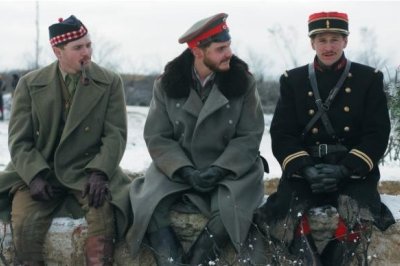Reviews - Joyeux Noel
Joyeux Noel
Reviewed By John Stakes

Joyeux Noel
Christmas is almost upon us, and with a delightfully calculated sense of timing the Club presented its seasonal offering last Sunday to a hugely receptive audience. However, French writer- director Christian Carion’s “Joyeux Noel” is no homespun saccharine filled family fun film set somewhere twixt Lapland and Tinseltown. For the last film in the autumn season we were taken to meet WW1 battle-scarred combatants, entrenched deep in the French countryside.
The film is based on the true stories surrounding the WW1 ceasefires along the Western Front in December 1914, some five months only into the war and is centred on six main characters; Gordon, (a Scottish Lieutenant); Audebert (a French Lieutenant and reluctant son of a general); Horstmayer (a Jewish German Lieutenant); Palmer (a British priest working as a volunteer stretcher-bearer); and a German tenor Nikolaus Sprink and his Danish lover Anna Sorenson (two famous opera stars). In a series of quick-fire vignettes and with crystal clarity Carion immediately establishes their character, motivation and attitude to war, and, more significantly, their collective fear and growing scepticism as to the prospects of an early successful outcome.
The front-line conscripts find themselves in much closer proximity to each other in their trench positions than they and we might have appreciated which Carion cleverly illustrates by the sound of a certain alarm clock being heard in each of the French Scottish and German dugouts. The conditions of these men contrast sharply with those of their superior officers who continue to live the high life behind lines as Christmas approaches and their countrymen are killed daily in their thousands.
The impromptu ceasefire which is to bring both sides unarmed into no man’s land is initiated by the Scots who begin to sing Christmas carols to bagpipe accompaniment. This prompts Sprink to respond by singing to his German colleagues and to exit his trench carrying a small Christmas tree. The French, German and Scottish officers then meet and agree on a cease-fire for the evening. The troops from both sides meet and exchange photos, chocolate and champagne, and wish each other a Happy Christmas. Palmer and the Scots celebrate a brief mass in Latin to which all the troops respond except Jonathan a Scot who earlier had to abandon his brother William in no man’s land as they retreated following an assault on the German trenches.
On Christmas Day the officers have coffee together, decide to bury their dead on Christ’s birthday and later the same day play football. The following day, having sheltered each other from an artillery barrage, they decide to call a halt to the truce but of course then have to face the consequences which understandably none had taken the time to consider.
In recreating these surreal events and their aftermath Carion’s screenplay, direction and the film’s editing were nothing short of masterful. A tad sentimental at times perhaps, with some suspension of disbelief, but Carion nailed the futility and waste of human life of this war with a succinct, intelligent script which struck just the right balance between the humour generated by the bizarre circumstances and the horror of trench warfare. Each tightly drawn interlocking scene was skilfully crafted and marshalled, none better than in the film’s opening sweep of the camera as it soared across the Scottish countryside to settle on the little church and to close in on the candles tellingly extinguished by the closing door, only to move swiftly on to the candle-lit stage of a German opera.
Carion’s attention to detail was matched by his ability to paint a broader canvas when needed, and he never allowed sentimentality to undermine emotional honesty. The high quality international cast instantly inhabited their characters enabling Carion to deliver a film which was satisfying both as a human drama and as an intellectual and thought provoking exercise on the morality of, and the conundrum that is, war.
This 2005 film, somewhat ironically, was a European co-production, and was nominated in the best film in a foreign language category at the 2006 Oscars and BAFTA awards. By concentrating on a lighter iconic incident in a war which yielded a greater body count than any other in history, Carion’s movie could be seen as lightweight, but his handling of the material and direction elevated it alongside the other few but nonetheless notable films about WW1. Its depiction of fleeting international fraternisation even helped to sow the seeds of the German Youth Hostel Association.
Carion’s film is a worthy testament to the true Christmas message and was one of the best received films in the history of the Club.
The film is based on the true stories surrounding the WW1 ceasefires along the Western Front in December 1914, some five months only into the war and is centred on six main characters; Gordon, (a Scottish Lieutenant); Audebert (a French Lieutenant and reluctant son of a general); Horstmayer (a Jewish German Lieutenant); Palmer (a British priest working as a volunteer stretcher-bearer); and a German tenor Nikolaus Sprink and his Danish lover Anna Sorenson (two famous opera stars). In a series of quick-fire vignettes and with crystal clarity Carion immediately establishes their character, motivation and attitude to war, and, more significantly, their collective fear and growing scepticism as to the prospects of an early successful outcome.
The front-line conscripts find themselves in much closer proximity to each other in their trench positions than they and we might have appreciated which Carion cleverly illustrates by the sound of a certain alarm clock being heard in each of the French Scottish and German dugouts. The conditions of these men contrast sharply with those of their superior officers who continue to live the high life behind lines as Christmas approaches and their countrymen are killed daily in their thousands.
The impromptu ceasefire which is to bring both sides unarmed into no man’s land is initiated by the Scots who begin to sing Christmas carols to bagpipe accompaniment. This prompts Sprink to respond by singing to his German colleagues and to exit his trench carrying a small Christmas tree. The French, German and Scottish officers then meet and agree on a cease-fire for the evening. The troops from both sides meet and exchange photos, chocolate and champagne, and wish each other a Happy Christmas. Palmer and the Scots celebrate a brief mass in Latin to which all the troops respond except Jonathan a Scot who earlier had to abandon his brother William in no man’s land as they retreated following an assault on the German trenches.
On Christmas Day the officers have coffee together, decide to bury their dead on Christ’s birthday and later the same day play football. The following day, having sheltered each other from an artillery barrage, they decide to call a halt to the truce but of course then have to face the consequences which understandably none had taken the time to consider.
In recreating these surreal events and their aftermath Carion’s screenplay, direction and the film’s editing were nothing short of masterful. A tad sentimental at times perhaps, with some suspension of disbelief, but Carion nailed the futility and waste of human life of this war with a succinct, intelligent script which struck just the right balance between the humour generated by the bizarre circumstances and the horror of trench warfare. Each tightly drawn interlocking scene was skilfully crafted and marshalled, none better than in the film’s opening sweep of the camera as it soared across the Scottish countryside to settle on the little church and to close in on the candles tellingly extinguished by the closing door, only to move swiftly on to the candle-lit stage of a German opera.
Carion’s attention to detail was matched by his ability to paint a broader canvas when needed, and he never allowed sentimentality to undermine emotional honesty. The high quality international cast instantly inhabited their characters enabling Carion to deliver a film which was satisfying both as a human drama and as an intellectual and thought provoking exercise on the morality of, and the conundrum that is, war.
This 2005 film, somewhat ironically, was a European co-production, and was nominated in the best film in a foreign language category at the 2006 Oscars and BAFTA awards. By concentrating on a lighter iconic incident in a war which yielded a greater body count than any other in history, Carion’s movie could be seen as lightweight, but his handling of the material and direction elevated it alongside the other few but nonetheless notable films about WW1. Its depiction of fleeting international fraternisation even helped to sow the seeds of the German Youth Hostel Association.
Carion’s film is a worthy testament to the true Christmas message and was one of the best received films in the history of the Club.
Find A Film
Search over 1500 films in the Keswick Film Club archive.
Friends
KFC is friends with Caldbeck Area Film Society and Brampton Film Club and members share benefits across all organisations
Awards
Keswick Film Club won the Best New Film Society at the British Federation Of Film Societies awards in 2000.
Since then, the club has won Film Society Of The Year and awards for Best Programme four times and Best Website twice.
We have also received numerous Distinctions and Commendations in categories including marketing, programming and website.
 Talking Pictures
The KFC Newsletter
Talking Pictures
The KFC Newsletter
Links Explore the internet with Keswick Film Club


